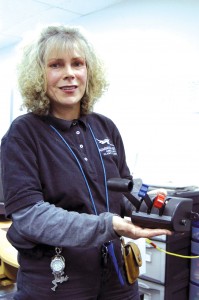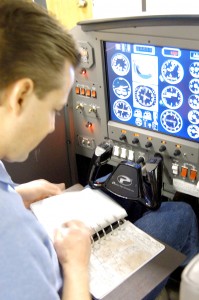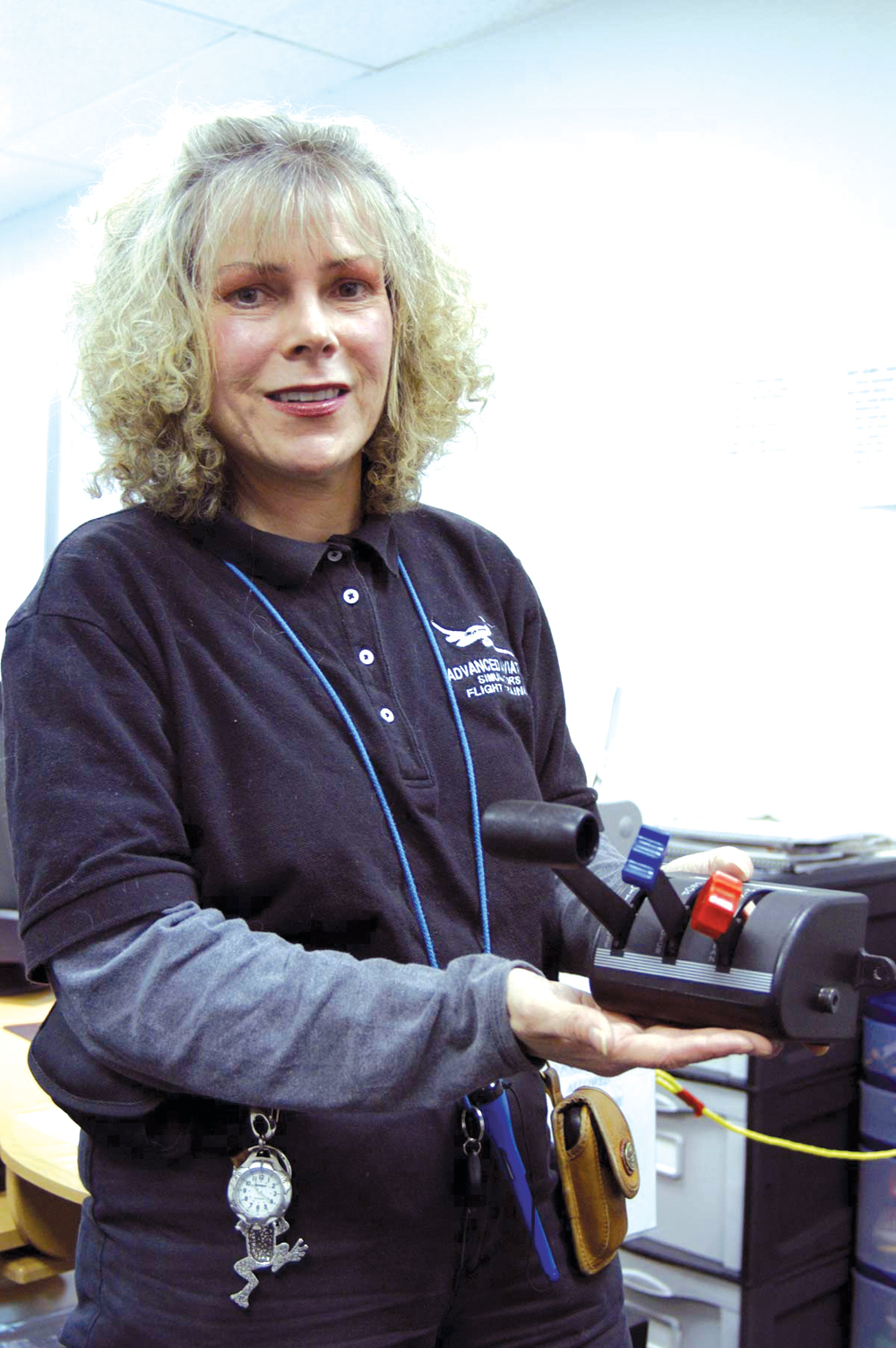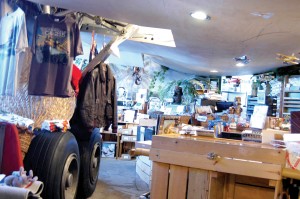By Shari Valenta

Lisa Neifert can change out the controls for a single or multiengine airplane aircraft simulation. Here, she holds the throttle quadrants for a single-engine airplane.
Lisa Neifert, owner of Advanced Aviation Simulators at Centennial Airport, is determined that everyone will learn how to fly a plane before leaving her hangar.
Competent and self-reliant, the petite blonde has been a pilot since 1987. Before setting up business last July in TAC Air’s Hangar 8, Suite 204, she ran two other flight schools, one at Essex County Airport in Caldwell, N.J., and one at Teterboro Airport, also in New Jersey.
“At Essex County Airport, I worked at Mac Dan Aviation, which owned Teterboro Flight Academy,” Neifert said. “I ran back and forth between the two schools. Mac Dan Aviation had 1,500 club members and 900 non-members, and Teterboro Flight Academy had about 1,000 members. We had a total of 60 airplanes; they were both very busy schools.”
Neifert, who chose Centennial Airport because of its bustling reputation, says competition isn’t a big concern to her, because her simulators are the most up to date on the airport. Also, since August, she’s able to further generate repeat customers with her new statewide flight club, the Colorado IFR Club. Members receive perks such as discounts when renting the simulators.
One of Neifert’s clients is Todd Smith, who utilizes a simulator at Advanced Aviation to practice for airline interviews. He makes the commute all the way from Broomfield because he likes the price.
“It’s cheaper than renting an airplane,” remarked Smith. “Typically, I can rent a Cessna 172 for $73 bucks an hour. Here I can have unlimited use of a simulator for $200 a month.”
Neifert’s concern about up-to-date simulators stems from her experience back in New Jersey, when she wasn’t always happy with the simulators available.
“They had a really old simulator that sat on a table to use in teaching instrument flying,” she said. “It cost about $40 an hour, which to me was high in the 1980s. At Teterboro, there was a simulator that wouldn’t do anything accurate. That bugged me, because half the time the instructors would try and decipher what was wrong. Meanwhile, the students are paying for it hourly.”
On a visit to Sun n’ Fun, held annually in Lakeland, Fla., Neifert discovered a simulator that really impressed her. She ended up buying an ELITE King Air B200.
“It’s just amazing how accurate it is, because it’s aircraft specific,” she said. “It’s calibrated to fly just like a King Air.”
Neifert actually has three simulators on hand, including a couple life-size cockpit simulators. Those two full visual, level three simulators are the first of their type to be used along the Front Range. The ELITE King Air B200, in the iGATE series, is a turbine full visual simulator that rents for $75 an hour. The other is a brand-new Modular Flight Deck ($200/mo. for members and $50/hr for non-club members).
The final simulator, the ELITE PI-135 Basic ATD, is a simple flight simulator that rents for $100 a month ($35/hr for non-club members).
Neifert says the ELITE King Air will soon be an insurance-approved simulator for initial and recurrency training. The MFD simulator has a broad range.
“It teaches from primary students right up to ATP, and trains multi- and single-engine aircraft,” she said. “With the MFD, you can legally log up to 20 hours toward an instrument rating, 50 hours toward a commercial rating and 25 hours toward an ATP rating, with a CFII.”
It has the helpful feature of interchangeable throttle quadrants for single- or multi-engine aircrafts.
Coming this spring, Cirrus simulator software will be installed to level three standards. Neifert explains that since the Cirrus is an all-glass cockpit aircraft, it’s quite an adjustment to learn.”
“Pilots have to understand how to transition from steam gauges to all glass cockpits,” she said. “They call it ‘understanding glass.’ It’s a very expensive airplane to rent. When you can learn it in the comfort of the simulator, you can set it on a freeze mode while the instructor explains the layout. It’s very cost efficient that way.”
An added benefit is that studies show that learning on simulators results in 97 percent learning retention, compared to 17 percent when learning on the actual aircraft. Neifert often tells students to incorporate simulator training with their flight training.
“That’s invaluable,” she said. “They literally save thousands of dollars on their ratings. That’s why United or Frontier incorporates simulators. If they were to use jets, it would cost millions of dollars to train those pilots.”
The simulators come with different features to make the flying experience seem real. Much like the Wizard of Oz controlled the fire and voice that scared the cowardly lion, Neifert can control things like wind and visibility conditions to challenge the user.
“Look at your DME,” she exclaims, before asking, “Are you following the VOR?”
A change of settings and a student is “flying in the soup.”
“I can change a lot of things, even the fuel tank switches,” explained Neifert.
With the twin-engine simulator, Neifert says, students can come in and practice minimum control speed for engine failure. In light of recent accidents at Centennial Airport and elsewhere, she stresses the importance of fully understanding how a twin acts and behaves when there’s a problem.
“They’re really squirrelly when they lose an engine,” she said. “Getting correct training for that is very valuable. You need to understand the airplane you’re getting trained in.”
She also points out that insurance companies are stressing the need for pilots to get simulator training, which results in insurance breaks.
“They recognize how valuable simulators are,” she said.
At Advanced Aviation Simulators, clients are welcome to bring their own instructors. However, Neifert has six on hand.
“Our instructors are airline pilots that teach advanced instrument training, so they have thousands of hours of flight time,” she said. “All have current CFII instructor ratings.”
Instructional DVDs are also available. Members of the Colorado IFR Club can check them out for $40 the first week; after that the cost goes down. Non-club members can rent them for $45 per week. Video tapes are only five dollars to rent for anyone who is interested.
For more information, call 303-649-9901, or e-mail Lisa Neifert at AdvancedSimulators@yahoo.com.
The Bamboo Airstrip

Todd Smith uses a simulator to practice for an airline interview. He makes the commute all the way from Broomfield because he likes the price.
The Bamboo Airstrip, located at Denver jetCenter West at Centennial Airport, is a charming gift shop decorated as a cargo jet that fell headlong into the jungle.
“I thought it would be fun to have a theme and something that would be more of a destination for people to visit,” said owner Jean Fonden. “It’s as if the pilots crashed and are now unscrupulously selling cargo.”
A curved ceiling causes customers to feel they’re underneath an aircraft. The walls are complete with rivets, and the store is embellished with tropical greenery.
“I wanted something customers could make as a destination for their cross-country trip, like a lot of Coloradoans who fly, for example, to Cabela’s,” Fonden said. “It’s not so much flying here as it is to have a destination in general.”
Inside the shop you’ll find anything from whimsical goods such as aviation map mouse pads and children’s bomber jackets, to more practical items, like headsets, transceivers, intercoms and ICOM radios. Some more novelty items include everything that one could possibly think of in the theme or shape of an airplane, like chocolate, puzzles, magnets, signs, posters, T-shirts, doormats, lights, wine charms and whistles that sound like a propeller.
On the more useful side, there are VFR and IFR maps and training manuals, and the store is quickly becoming the largest distributor of aviation-related software in Colorado. For those preparing to interview for a pilot position, there are materials available for this purpose. This month, the “FarAim 2005: Federal Aviation Regulations and Aeronautical Information Manual” is two dollars off, while supplies last.
The store is soon to run specials on ICOM radios. And if something isn’t in stock, Fonden will try to order it from another source.
One of the reasons why her business booms is because pilots need to purchase IFR maps every 56 days and VFR maps every six months.
“The location is wonderful; it really is,” said Fonden. “We get a lot of the corporate people in here with a lot of time (between flights). If they’re tired of watching movies in the newsroom they can shop here.”
Since Fonden has owned the shop for 20 years, she knows where to find the latest items, such as at air shows like EAA AirVenture and Sun n’ Fun.
Fonden, a single mom with three children—her two daughters and son are all pilots—says the store has been a good experience for all of them.
“The children grew up in the business so all have their pilot’s licenses,” she said. “My son is working on his instrument license right now; he might make it a career. The two older ones just started their own business.”
Fonden says she kept up the shop all these years because she enjoys working with the aviation community.
“It’s been a lot of fun; the pilots are great people,” she said. “They’re a lot like campers, in that they’re happy to share information and stories. We’re so fortunate because our customers never come to us because they have to. It’s not a dentist’s office or a bank. When they come to the airport, it’s generally because they want to be here.
“They like to poke around and talk to people. It’s a social life, more or less. We see the best side of people. Everybody has their first flight and everybody remembers those milestones. There’s camaraderie. It doesn’t matter if you’re flying in Maine or if you’re flying in Hawaii; wherever you land when you come back to the airport, there’s a common bond.”
Fonden boasts that her employees bend over backwards for their customers.
“We had a manufacturer make a mistake in delivering some headsets to us,” recalled Fonden. “The woman who purchased the headsets was from Longmont and needed them for a flight. Justin (Fonden’s employee) drove some loaners up to her so she could take her trip.
“When they returned, their headsets had arrived. Justin received this great thank-you note because he saved the day. That’s what we like to do; we’re all about service. You can order from a catalogue, but we like to emphasize the fact that we’re here, we’re open seven days a week and we’re going that extra mile, because we think that is what the customer deserves.”
Fonden has another location at Air West, at Jefferson County Airport. Many items available at the Centennial store may be shipped to that location.
Fonden says that one of her dreams is to someday be the area’s largest oxygen supplier.
“One of my goals this year is to become the oxygen expert,” said Fonden. “Studies show that oxygen helps at night when pilots are tired. Most accidents occur then because pilots aren’t getting enough oxygen. We live in one of the highest elevation (areas), but we don’t really have any oxygen outlets available.”
For more information about The Bamboo Airstrip, located at 7625 S. Peoria Street, call 303-790-0709 or visit [http://www.bambooairstrip.com/]. Hours are Mon.-Fri., 8:30 a.m.-5:30 p.m. and Sat.-Sun., 8:30 a.m.-5:00 p.m.












